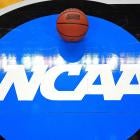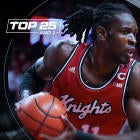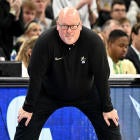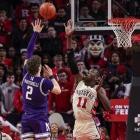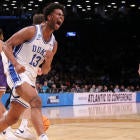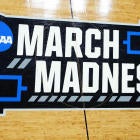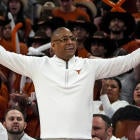NEW YORK -- All three defendants in the first college basketball corruption trial were found guilty of conspiracy to commit wire fraud on Wednesday.
A jury found James Gatto guilty on all three of his counts and Christian Dawkins and Merl Code were found guilty on both of theirs.
Gatto is a former Adidas employee, Code a former consultant. Dawkins is a former aspiring sports agent. The outcome of the trial stands to have widespread impact on college athletics in the coming months and years, be it in the continued reform of NCAA bylaws or by way of punishments against coaches and/or schools down the road.
The U.S. Attorney's Office in the Southern District of New York successfully argued the trio of men defrauded the University of Louisville and the University of Kansas in the process of helping funnel money -- and recruits -- to those schools, with the intention of later signing prospects to endorsement deals.
All three were found guilty on wire fraud and specific conspiracy to commit wire fraud against the University of Louisville. Gatto's third guilty count was a conspiracy to commit wire fraud against the University of Kansas.
"The jury was out three days, so obviously they thought about it, struggled with their decision," Steve Haney, lawyer for Dawkins, told CBS Sports. "There's a little bit of comfort knowing that we worked hard and made them think about what their verdict was going to be."
Lawyers representing Gatto and Code opted not to comment afterward. Dawkins and Code also declined comment when approached by CBS Sports.
The three men will report for sentencing the morning of March 5, 2019. Until then, they'll remain free and out on bond. Dawkins and Code are defendants in a second of three cases in this overarching saga.
"We're still intent on fighting that case as well," Haney said.
None of the defendants in the case had a criminal record prior to this trial.
Each defendant plans to appeal the verdicts, though a timeline for that remains unclear. This case was potentially groundbreaking, as it established a violation of rules against a private organization (the NCAA) could amount to federal fraud. A lingering aspect of this trial was how the jury pool was established. Members of the jury were specifically picked based on their lack of knowledge regarding the NCAA and a general naiveté about the environment of college basketball.
Judge Lewis A. Kaplan made it his duty throughout the trial to make sure the defense could not bring moral matters regarding NCAA rules on not paying amateur athletes into argument.
When Haney was asked if he thought that was a pivotal factor in Wednesday's outcome, he declined to speculate too much.
"There's nothing we can do about that," Haney said. "It's a jury pool that -- we do the best to select that we believe can be favorable to the client. These were difficult issues that were never presented, really, in court before. This is a new theory of litigation that they brought. There's some complex issues and a lot of information for them to decide. It was a difficult case."
Wednesday's sweep of guilty verdicts amounts to a significant, landmark win for attorneys representing the government, who made a winning case that Gatto, Code and Dawkins were not only compromising major universities, but that paying players without the explicit knowledge of coaches and others at those schools has now been established as a violation of federal law.
That is the case because the violation amounts to federal fraud due to those universities receiving federal funds. All the schools tied to Wednesday's verdicts are public universities.
Adidas, which sponsors Kansas and Louisville, put out a statement in the wake of the verdicts coming in. It reads: "We cooperated fully with the authorities during the course of the investigation and respect the jury's verdict. We look forward to continuing to work with the NCAA and other stakeholders in a collaborative and constructive manner to improve the environment around college basketball. We have strengthened our internal processes and controls and remain committed to ethical and fair business practices."
This legitimacy of this case was scoffed at by many within college sports circles when the charges were brought down in September of 2017, but the untold millions of dollars the government put into this case paid off significantly.
The next trial, which involves former Auburn assistant and NBA player Chuck Person, is scheduled to start in February.












